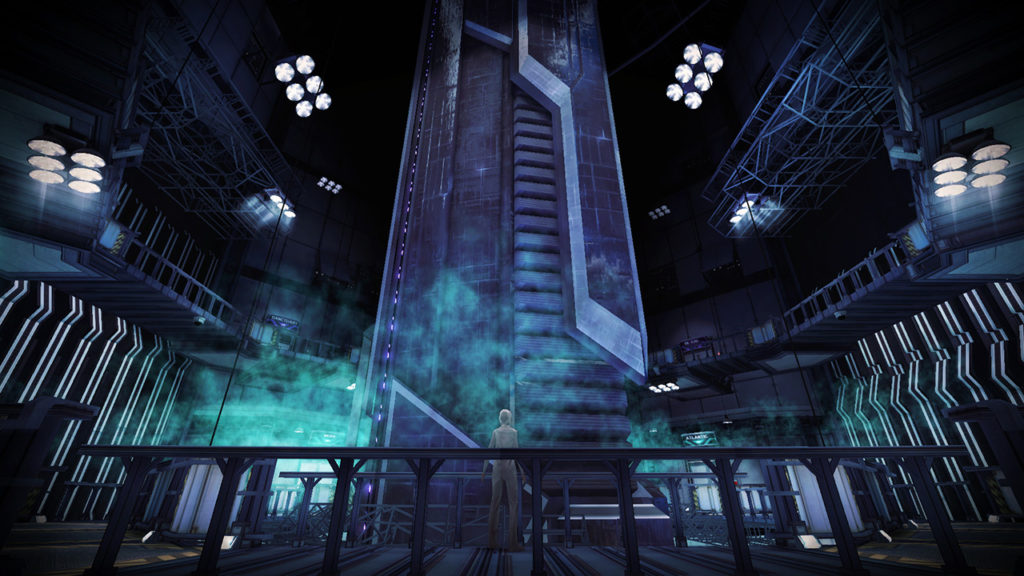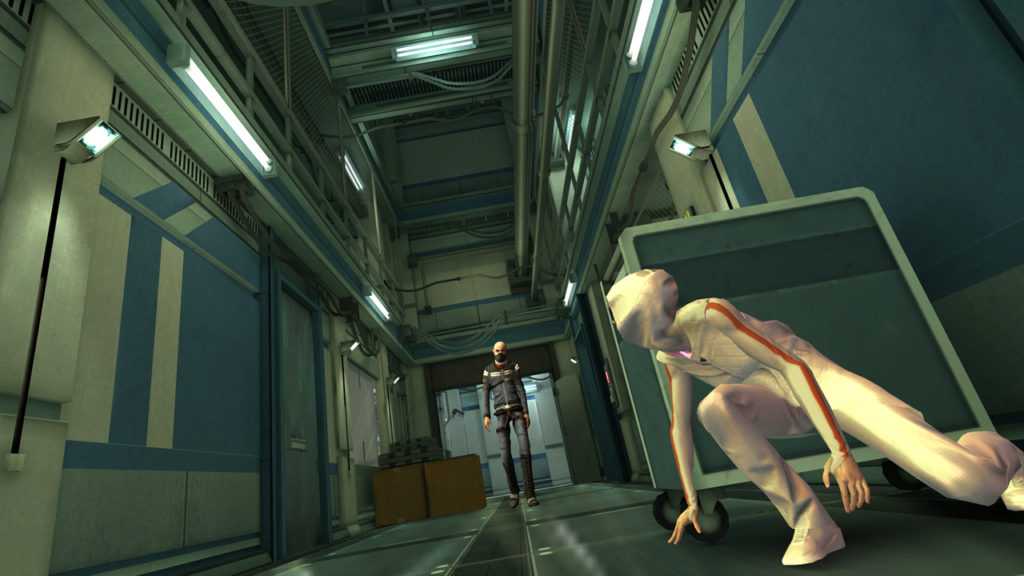As a fan of all things dystopian, Republique is a game that should be my cup of tea. Blending themes from classic novels such as Orwell’s 1984, Huxley’s Brave New World and Gibson’s Neuromancer, it’s a unique approach to the stealth genre in which the player controls both the surveillance cameras tracking the character and the main protagonist in tandem. It’s got strong production values, including a voice cast featuring David Hayter and Jennifer Hale. It’s got an atheistic which sits somewhere between DONTNOD’s Remember Me, Metal Gear Solid and the original Resident Evil. Republique is a game chock full of potential, but one that, ultimately, ends up being less than the sum of its parts.
It all starts with the player answering a call from an unknown number. On the other end of the phone is a young woman named Hope, pleading for your help, and living inside a facility called Metamorphosis within an unnamed totalitarian state. Hope has been scheduled for “recalibration”, after reading a forbidden text (which is just as awful as it sounds and involves erasing your personality wholesale). It’s at this point that control is handed over to the player, as you are transferred into Metamorphosis’ computer network, and given the ability to control surveillance cameras, open and shut doors, eavesdrop on company communications, scan posters for more information and clues and generally use the environment to help Hope slip past the guards to ultimately escape Metamorphosis.
The whole system creates an interesting dichotomy between the player, who has the ability to passively control the environment, and Hope, who is actively attempting to evade capture. With the push of a button, you can pause time and bring up a list of everything in the area you can interact with, as well as hop from camera to camera to help plan out the fastest, safest route for Hope to take through guarded areas without being detected. This requires a rather methodical approach as, save for a few (literal) get out of jail free cards like canisters of pepper spray and tasers that Hope can scavenge, she has no way to fight the guards. In a nice twist, rather than an annoying game over screen when she gets caught, Hope is merely frogmarched to the nearest holding cell, at which point you get another chance to sneak through the area undetected.
Republique’s sections can be a thrilling and cerebral game of cat and mouse, with you surveying the scene, hopping from camera to camera, unlocking doors and generally creating havoc in order to create an unopposed path to Hope’s next objective. You then take direct control of Hope with the left stick, and carefully weave her through the environment, safe in the knowledge that you already know the routes the guards will take and have already taken care of a few other obstacles beforehand.
Hope also has to ability to pick the pockets of unsuspecting guards. Along with the occasional defensive item, you’ll also find a collectable floppy disk featuring artwork from real-life video games. Examining the disc in your inventory treats you to a fun appraisal of the game. It’s a nice little extra that encourages you to change your tactics in order to grab all those special game discs, and there are a few trophies available for successfully nabbing them all.

Unfortunately, Hope’s movements on Switch are far clumsier than they should be, often snapping to cover and then refusing to let go. Likewise, the analogue movement doesn’t work well with the game’s fixed camera angles either, as Hope’s direction of travel often shifts as you enter a new room, making her run in the wrong direction. This makes transitioning from one place to the next feel very disorienting as a result. To make up for this, though, each area has numerous hiding spots, defensive weapons are plentiful, and the guards are all idiots. However, once you get to grips with the fundamentals, Republique’s stealth sections become incredibly easy and eventually start to feel very repetitive over the course of its five episodes. It ends up being just a necessary evil you have to suffer through to get to the narrative.
When you’re not avoiding guards and solving simple puzzles, you need to scan every inch of the environment, as this is where you’ll find the various artefacts that you’ll need to find in order to piece together Republique’s narrative; Every poster, discarded object, point of interest, and the collectable item will unlock a recording which gives another insight into Metamorphosis and its people. As you progress through the game, the wider story is revealed, and you learn about the tyrannical Overseer Treglazov, Daniel Zager’s failed revolution and Hope’s role in the whole sordid affair.
Each recording is wonderfully acted, and together they make for a brilliant little radio play. But the passive nature of the recordings, coupled with the fact that you need to stop and scan everything in the room in order to progress the story slows the pacing and action down to a crawl, which feels completely at odds with Hope’s desperate escape bid. Plus, if you don’t take the time to scour every last bit of the environment and listen to every recording you will miss vital information and plot points, which I can help but see as slightly unfair.

However, even if you do manage to listen to everything, Republique’s narrative still feels somewhat moth-eaten. This is due mostly to the episodic structure, originally being released sporadically over the course of four years. It starts off strong, drip-feeding you just enough of the details to get you hooked, and keep you moving forward while maintaining a thick air of intrigue and mystery. However, you never seem to get any answers. Then suddenly, in episode four (where you would think the narrative would start to come together toward some conclusion), Republique takes a weird turn into horror territory – disabling your trusty map, introducing a bunch of new mechanics, characters and narrative details that make almost no sense. Just before discarding pretty much everything at the start of the final chapter.
The finale feels rushed, hurrying you through a few final challenges before a somewhat puzzling (and ultimately disappointing) conclusion. In the end, it seems like such a waste, after the game’s early stages spend so much time world-building, fleshing out even minor ancillary details about the setting you’re vicariously wandering through, that it forgets to make sure that your actions appear to have an actual meaningful impact on the world. If the game were better paced (and chapter four had decided not to jump the shark), with the narrative being told in the present via actual in-game dialogue and cutscenes, the game’s larger narrative beats would have hit home a lot harder than they actually do.
Republique is a biting polemic about the potential dangers of modern-day fascism, and how the internet and other technology created to protect us could ultimately be used by the power-hungry and corrupt to enslave us (and you need only read up on Teresa May’s proposed snooper’s charter to see it’s a lot closer than you think). It presents its themes in a clever manner, and the idea of acting as both impartial voyeur into the electronic eyes of a totalitarian state and slave actively attempting to escape from the dystopian nightmare she finds herself trapped in makes for a unique gameplay experience. However, Republique’s numerous narrative and control issues mar what could have otherwise been a classic.


















